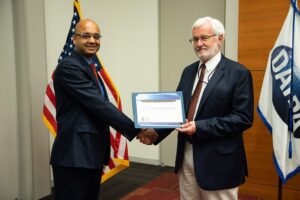MENLO PARK, Calif.— July 16, 2019 — SRI International researcher Parijat Bhatnagar, Ph.D., has been named a winner of the 2019 Defense Advanced Research Projects Agency (DARPA) Young Faculty Award (YFA) for his project “Remote Regulation of Cellular Medicine with Extracorporeal Devices”. Bhatnagar and his team intend to engineer immune cells that can be remotely activated to protect U.S. troops against acute viral infections.

The objective of the DARPA YFA program is to identify and engage rising stars, and expose them to DoD needs and DARPA’s program development process. The program provides funding, mentoring, and industry and DoD contacts to awardees early in their careers so that they may develop their research ideas in the context of national security needs.
Bhatnagar, a program director for Cell-Based Medicine in SRI International’s Biosciences division, will receive up to $1 million over 36 months to support his research.
“Parijat is a truly exceptional scientist who is re-imagining how we can leverage the human immune system to provide flexible and sustained protection against infection and epidemics,” said Peter Madrid, Ph.D., senior director and head of the SRI Biosciences Division Applied Research group. “We very much look forward to seeing the results of this exciting and novel concept.”
Currently, there are no truly effective measures for preventing or controlling epidemics caused by acute viral infections. This presents a significant, strategic threat to U.S. military. Bhatnagar’s research will focus on engineering a new signaling pathway within immune cells that can be used to control the cells via signals delivered from outside the body. In the presence of a natural or weaponized viral pathogen, the cells will be remotely activated to trigger immunity. This “engineered immunity” will have broad specificity and could be rapidly deployed against a wide spectrum of emerging and re-emerging viruses. Accordingly, it could overcome the significant challenges associated with developing a vaccine for each new virus and administering doses to individual recipients.
“I am honored to be among the impressive group of young investigators receiving DARPA awards this year,” said Bhatnagar. “This award will allow me to pursue my passions for exploring interdisciplinary sciences and for inventing new, more efficient ways to advance human performance. I am proud to be a part of SRI, which is trusting me to conduct this groundbreaking research and to develop revolutionary technologies that can serve our nation.”
Bhatnagar’s research is also supported by the National Institutes of Health (NIH) Director’s New Innovator Award and has been administered by the National Institute of Biomedical Imaging and Bioengineering (NIBIB); and the Innovative Molecular Analysis Technologies (IMAT) program, a niche program within the National Cancer Institute (NCI), which supports potentially transformative next-generation technologies for targeting cancer.
About SRI Biosciences
SRI Biosciences, a division of SRI International, integrates basic biomedical research with drug and diagnostics discovery and preclinical and clinical development. SRI International, a research center headquartered in Menlo Park, California, creates world-changing solutions to make people safer, healthier, and more productive.
SRI International
SRI International creates world-changing solutions making people safer, healthier and more productive. SRI, a research center headquartered in Menlo Park, California, works primarily in advanced technology and systems, biosciences, computing and education. SRI brings its innovations to the marketplace through technology licensing, spin-off ventures and new product solutions.



